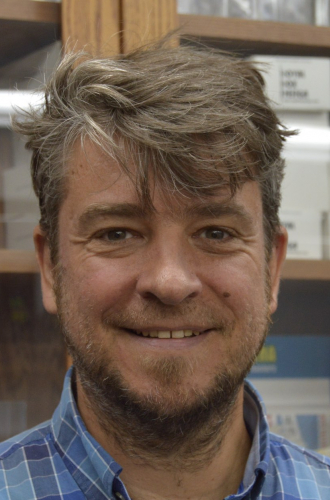-

-

-
Mark Lever
Associate Professor
Department of Marine ScienceBiogeochemistry, microbial ecology, geobiology, natural and anthropogenic controls on the carbon cycle in sedimentmark.lever@austin.utexas.edu
Office Location
S06
Postal Address
750 CHANNEL VIEW DR
PORT ARANSAS, TX 78373-
EDUCATION
PhD in Marine Sciences, Dept. of Marine Sciences, Univ. of North Carolina at Chapel Hill, USA (2008).
Master of Arts in Marine Biology, Boston University Marine Program, Woods Hole, USA (2002).
Bachelor of Arts in Biology with Minor in Music, Boston University, Boston, USA (1999).
PROFESSIONAL EXPERIENCE
Aug 2022 – present Associate Professor of Marine Biogeochemistry and Geobiology, Univ. Texas Austin.
2014 – present Adjunct Professor, Center for Geomicrobiology, Aarhus University, Denmark.
2014 – 2022 Assistant Professor of Environmental Microbiology, ETH Zurich.
2013 – 2014 Research Associate, Aarhus University, Denmark.
2011 – 2012 Marie-Curie Intra-European Postdoctoral Fellow, Aarhus University, Denmark.
2009 – 2010 Postdoctoral Scientist, Center for Geomicrobiology, Aarhus University, Denmark.
-
My research is driven by my interest in in Earth’s carbon cycle. I pursue research questions of broad significance concerning the mechanistic (how?) and quantitative (how much?) influence of microorganisms, humans, and abiotic factors on the short- and long-term fate of organic carbon in aquatic sediments and Earth’s crust.
Currently, I am particularly interested in the following areas:
(a) Influence of human societies on organic carbon sequestration in and greenhouse gas emissions from aquatic sediments.
(b) Interactions between paleoenvironmental, sedimentological, geochemical and microbiological processes in controlling the long-term fate of organic carbon in marine sediments.
(c) Deciphering anaerobic microbial food webs by linking organic carbon chemical compositions to the microorganisms and biochemical processes that transform them.
(d) Role of macrobiota in driving carbon and nutrient cycling in marine and freshwater sediments.
(e) Design of sustainable strategies, including seaweed farming, to enhance the burial of atmospheric CO2 in aquatic sediments and reduce greenhouse gas emissions.
(f) Importance of tectonic processes and deep mantle-derived energy sources in sustaining subseafloor life.
-
2023
Su G, Tolu J, Glombitza C, Zopfi J, Lehmann MF, Lever MA, Schubert CJ. Methane production during early diagenesis of sedimentary organic matter in lake sediments. Sci Tot Environ, submitted.
Berg JS, Rodriguez PC, Magnabosco C, Deng L, Bernasconi S, Vogel H, Morlock M, Lever MA. Active microbial sulfur cycling in 13,500-year-old lake sediments. Biogeosciences, submitted.
van Grinsven S, Maeda N, Glombitza C, Lever MA, Schubert CJ. The effect of a short oxygen exposure period on algal biomass degradation and methane formation in eutrophic and oligotrophic lake sediments. Limnol Oceanogr, submitted.
Fatemeh A, Lever MA, De Jonge C. The seasonal variability of aquatic brGDGTs: a mesocosm approach. Org Geochem, under revision.
Muschick M, Jemmi E, Lengacher N, Hänsch S, Wales M, Kishe MA, Mwaiko S, Dieleman J, Lever MA, Salzburger W, Verschuren D, Seehausen O, Ancient DNA is preserved in fish fossils from tropical lake sediments. Mol Ecol, accepted.
Gajendra N, Berg JS, Vogel H, Deng L, Wolf S, Bernasconi SM, Dubois N, Schubert CJ, Lever MA (2023) Carbohydrate compositional trends throughout Holocene sediments of an alpine lake (Lake Cadagno). Frontiers Earth Sci 11:1047224.
Deng L, Fiskal A, Bölsterli D, Meier D, Meile C, Lever MA (2023) Differential impact of two major polychaete guilds on microbial communities in marine sediments: a microcosm study. Frontiers Marine Sci 10:1119331.
Lever MA, Alperin MJ, Hinrichs K-U, Teske A (2023) Zonation of the active methane-cycling community in deep subsurface sediments of the Peru Trench, Frontiers Microbiol 14:1192029.
2022
Janssen DJ, Rickli J, Wille M, Sepúlveda Steiner OR, Vogel H, Dellwig O, Berg JS, Boffard D, Lever MA, Hassler CS, Jaccard SL (2022) Chromium cycling in euxinic basins challenges d53Cr paleoredox proxy applications, Geophys Res Lett 49:e2022GL099154.
Sena C, Parkhurst DL, Tepley FJ III, Jiang F, van der Land C, Coelho JRC, Oliveira V, Lever MA, Ishizuka O, Arculus R (2022) Formation of calcium chloride brines in volcaniclastic-rich sediments, Frontiers Earth Sci 10:869567.
Huang X, Liu X, Xue Y, Pan B, Xiao L, Wang S, Lever MA, Hinrichs K-U, Inagaki F, Liu C (2022) Anaerobic methane production by wood-rot fungi via a new, halomethane-dependent pathway, Microbiol Spectrum e01700-22.
Deng L, Meile C, Fiskal A, Bölsterli D, Han X, Gajendra N, Dubois N, Bernasconi S, Lever MA (2022) Deposit-feeding worms control subsurface ecosystem functioning in intertidal sediment with strong physical forcing, PNAS Nexus 1:pgac146.
Han X, Tolu J, Deng L, Fiskal A, Schubert CJ, Winkel LHE, Lever MA (2022) Physical shielding promotes long-term preservation of biomolecules in lake sediments, PNAS Nexus 1:1-15.
Bruni ET, Blattmann TM, Haghipour N, Louw DC, Lever MA, Eglinton TI (2022) Sedimentary hydrodynamic processes under low-oxygen conditions: implications for past, present, and future oceans, Frontiers Earth Sci 10:886395.
Baumann KBL, Thoma R, Callbeck CM, Niederdorfer R, Schubert C, Müller B, Lever MA, Bürgmann H (2022) Trophic status and local conditions affect microbial potential for denitrification versus internal nitrogen cycling in lake sediments. mSphere 7:e010130-21.
van Grinsven S, Meier D, Michel A, Han X, Schubert CJ, Lever MA (2022) Role of redox zone and trophic history as drivers of methanotrophic bacterial abundance and community structure in lake sediments. Frontiers Environ Sci 10:857358.
Berg JS, Lepine M, Laymand E, Han X, Vogel H, Morlock MA, Gajendra N, Gilli A, Bernasconi SM, Schubert C, Su G, Lever MA (2022) Ancient and modern geochemical signatures in the 13,500-year sedimentary record of Lake Cadagno. Frontiers in Earth Sci 9:754888.
-
Outstanding Review Editor, Frontiers in Microbiology (2022).
Outstanding Associate Editor, Frontiers in Microbiology (2021).
Whiteley Fellow, Friday Harbor Laboratories, University of Washington, USA (2018).
Distinguished Lecturer, European Consortium for Ocean Research Drilling (2016-17).
Outstanding Reviewer at Estuarine, Coastal and Shelf Sciences (2015).
Marie Curie Intra-European Postdoctoral Fellowship (2011-12).
Univ. of North Carolina at Chapel Hill – Dissertation Completion Fellowship (2007-08).
NSF-East Asia and Pacific Summer Institute fellowship (2007).
Schlanger Ocean Drilling Fellowship, IODP, U.S. Science Support Program (2006-07).
NSF Scholarship, Microbial Diversity course, MBL, Woods Hole, MA (2003).
Fellow, Sounds Conservancy, Québec-Labrador Foundation (2001-02).
-
Lever MA. Empirical and experimental evidence with bioturbating macrofauna indicates fundamental differences in the drivers of bacterial and archaeal community structure in marine sediment”, Aarhus University, Aarhus, Denmark, June 6, 2023. Oral presentation.
Lever MA. “The role of macrofauna in controlling the community structure of microorganisms in marine surface sediments”, Nereis Park Online Seminar Series, Nereis Park Association, May 9, 2023. Invited speaker.
Lever MA. “The carbon cycle in marine sediments – natural controls and human influences”, Advisory Council Meeting, Marine Science Institute, University of Texas at Austin, March 3, 2023. Oral presentation.
Lever MA. Potential importance of diffuse hydrothermal fluids in sustaining life in seismically active deep sea environments. Center for Planetary Systems Habitability, University of Texas at Austin, February 13, 2023. Oral presentation.
Lever MA. Temperature, energy availability, and their interactions as drivers of sediment microbial community structure, 4th International Workshop on Microbial life under extreme energy limitation (Sandbjerg Manor, Sønderborg, Denmark; September 5-9, 2022). Invited speaker.
-
Instructor, Graduate-level lecture course “Marine Biogeochemistry” (Marine Science 482C), annually starting in fall 2023 (with Zhanfei Liu)
Instructor, Undergraduate course “Estuarine Ecology” (Marine Science 382), spring 2024 (with Kenneth H. Dunton), every other year starting in spring 2024.
Instructor, Graduate-level seminar course “Topics in Marine Science: Marine Environmental Microbiology” (Marine Science 193), biannually starting in fall 2023.
-
Technical personnel
Victoria Grisson (research technician, since September 2023)
Graduate students
Kaitlyn Callagher (doctoral student; since August 2023)
Kyle Runion (PhD candidate; since August 2023)
Petra Steffen (PhD candidate visiting from University of Braunschweig, Germany; fall 2023)
Undergraduate students & interns
Victoria Grisson (January to August 2023)
Alan Vuong (June to August 2023)
-
All persons who are interested in interdisciplinary research on the cycling of organic carbon in sedimentary environments are welcome to contact me (mark.lever@austin.utexas.edu).
Similarly, I am always interested in supporting students with ideas of applying research in biogeochemistry and/or microbiology in areas outside the sedimentary realm, including but not limited to wastewater treatment, food and biofuel production, bioremediation, and recreational fields.
I am also a passionate hobby birder and always interested in projects that are bird-related.
-








